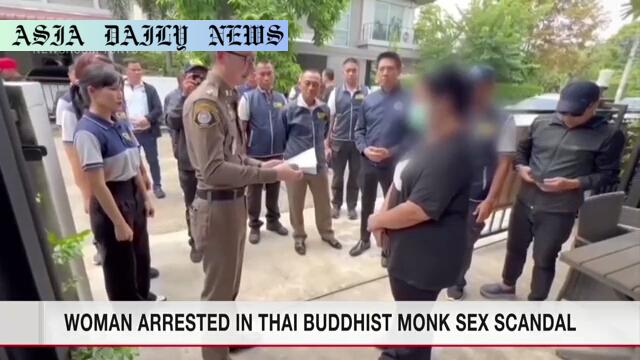Sex Scandal inflames Thailand as a woman is arrested for blackmailing Buddhist monks, exposing their secret affairs.
A 35-year-old woman in Thailand has caused a scandal by blackmailing monks based on alleged sexual affairs.
Evidence includes video clips and chat messages proving the misconduct.
Nine monks were involved, most of whom have left the monkhood following the exposed scandal.
The scandal highlights the vulnerability and accountability of religious figures in Thailand.

A Shocking Sex Scandal in Thailand Sparks outcry
The serenity usually associated with Thailand’s Buddhist temples was shattered by a major controversy, as a 35-year-old woman was arrested for blackmailing multiple monks over alleged sexual relations. This scandal has not only left the nation shocked but also raised concerns about the personal conduct within these sacred institutions. Police investigations revealed that the woman had maintained affairs with nine monks, leveraging intimate videos and messages to demand money. Most monks involved have already left the monkhood—a severe repercussion in the Buddhist community.
Buddhist monks are expected to adhere to a strict code of conduct that mandates celibacy and abstinence from intimate contact with the opposite sex. Violating these principles can lead to their removal and tarnish the spiritual fabric of the monastic order. According to the police, the suspect helped the monks “commit wrongdoing,” creating a ripple effect of disgrace across their ranks. As she stands accused of aiding in illegal activities and laundering money, her actions have sparked conversations surrounding accountability and exploitation in religious settings.
Public Outcry and Its Impact on Thai Society
The fallout from the scandal has been dramatic. Public sentiment in Thailand, a country deeply rooted in its Buddhist traditions, has been inflamed. Many citizens are grappling with a sense of betrayal, as monks embody spiritual sanctity and moral leadership. The involvement of not one but nine monks has extended the shockwave, raising questions about systemic vulnerabilities. The government has been called upon to strengthen the oversight of religious organizations and ensure strict enforcement of ethical codes.
Beyond the immediate effects on the monks involved, the scandal opens a broader dialogue about the role of trust and compliance within religious institutions. It leaves both adherents and skeptics wondering whether current mechanisms are sufficient to uphold the sanctity of monastic orders. Thai authorities have vowed to take swift action to ensure such incidents are not repeated.
Wider Implications and a Call for Reforms
This scandal not only sheds light on moral misconduct but also the darker side of exploitation and blackmail. While some argue that the monks failed to uphold their vows, others point to the predatory intentions of the woman who manipulated the situation to her advantage. What’s clear, however, is the need for both preventative measures and collective soul-searching within Thai society.
Experts suggest programs that focus on education and rigorous training for new monks about their moral responsibilities, coupled with a clear and accessible reporting structure to address misconduct. Additionally, the incident has ignited broader discussions about gender dynamics and how cultural norms may contribute to such occurrences in religious settings.
Moving forward, Thailand must recalibrate its approach to maintaining the integrity of its spiritual institutions. Public trust needs to be rebuilt through transparency, accountability, and a renewed emphasis on ethical monastic practices.



Commentary
The Devastating Impact of the Thai Monk Scandal
The Thai Buddhist monk sex scandal has been nothing short of a wake-up call for a nation that prides itself on its spiritual roots. The revelations of nine monks succumbing to temptation and being blackmailed by a single woman not only tarnish their individual reputations but also cast a shadow on the integrity of the religious system they represent. As a society, Thailand must now confront uncomfortable truths about the vulnerabilities within its spiritual domain.
One striking takeaway from this scandal is the fragility of the trust placed in religious leaders. Monks are seen as moral exemplars, guiding communities through their wisdom and discipline. When they falter, the betrayal feels deeply personal to their followers. It’s a stark reminder that oversight and accountability should be applied even to those holding seemingly impregnable positions of respect.
The Role of Exploitation and Accountability
Equally troubling is the exploitation by the accused woman, who manipulated the vulnerabilities of these monks for financial gain. While the monks have rightfully faced consequences for their actions, the role of external influences in precipitating their downfall shouldn’t be overlooked. This dual culpability—on both the monks’ and the woman’s part—complicates the narrative and makes it essential to address a broader cultural reckoning.
The incident raises critical questions: Are the expectations placed on monks too disconnected from modern realities? Does the surrounding ecosystem make it impossible for them to seek help in moments of weakness without fear of judgment or ostracization?
A Path to Healing and Rebuilding
This scandal is not just a cautionary tale but also an opportunity to reform and strengthen Thailand’s spiritual institutions. Efforts must go into fostering environments where ethical values are not just taught but lived consistently. At the same time, mechanisms to prevent blackmail and provide pathways for rehabilitation must be explored.
In the end, the resilience of Thailand’s Buddhist tradition will be proven by how it responds to this crisis. Moments like these serve as reminders that even the most revered institutions are not immune to human failings—but they also provide opportunities for growth and redemption.